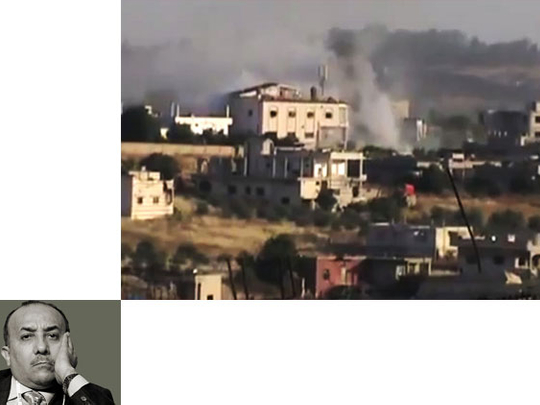
It seems our region is getting deeper into uncertainty and chaos, which is very frustrating. We are getting deeper and deeper into a tangled web and the plot is thickening and worsening.
Let us take a panoramic view of the region over the last few weeks.
Last week was a roller coaster, full of drama, excitement, mayhem and anticipation. From the sudden demise of the Saudi crown prince, Nayef Bin Abdul Aziz, to the soft coup by the Supreme Council of the Armed Forces (Scaf) in Egypt and the unabated march of political Islam; to the stunning decision by both the Egyptian and Kuwaiti Constitutional Courts to shut down the parliaments in both countries; to the one-two shocking punches in Kuwait by the Emir implementing for the first time Article 106 in the constitution, suspending the Kuwaiti National Assembly for one month. This was followed by the unprecedented ruling of the Constitutional Court, the highest court of the land, that the parliamentary election held in February was void because it violated constitutional procedures, leading to an annulment of parliament. More worryingly, it reinstated the defunct parliament, widely rejected by voters with a 56 per cent turnout. This ushered Kuwait into its deepest crisis in half a century of representative politics.
Egypt today has no president, parliament or constitution, Kuwait has no parliament, Syria is haemorrhaging to death, Lebanon is facing a meltdown, Yemen is teetering on the brink of collapse, Iraq’s security and political impasse is forcing the country into the abyss, Libya is run by local militias and war lords, while Tunisia, the brightest post of the Arab Spring model, is embroiled in a tug-of-war between hard line Islamists and die-hard secularists. This confusing and disjointed scene does not instil much confidence in where these changes are taking us.
Egypt, the central and pivotal Arab state — a trendsetter, so to speak, with close to 90 million people — seems to be coming apart at the seams. The nation is at a crossroads — searching desperately for its soul, with no president, no parliament and no constitution. How can you run a country that has no political system and is void of any branch of government and dominated by the omnipotent military junta which has governed the country for six decades?
No silver bullet
The two contenders for the post of president, Ahmad Shafiq and Mohammad Mursi, both claimed to have won the election. What has added to the drama is the postponement of results by the higher election committee. The web became more entangled when Scaf amended the constitution, giving it more legislative and executive powers, circumventing the power of the future president. The fait accompli of the results of the Egyptian presidential election could spark a second revolution in Egypt, regardless of who won. Unfortunately, there is no silver bullet for Egypt at this stage and things will only get worse.
In the meantime, Syria is sinking into civil war with daily massacres and carnage, shaming all of us and bankrupting the Arab and international morality and conscience. It is so painful to see the dynamics of regional and international power politics impact the Syrian mayhem at the expense of innocent civilians who are being slaughtered on a daily basis. The Syrian tinderbox is spilling over into Lebanon, Jordan and Turkey. We saw that in the sectarian strife in Lebanon. Just last week, a Syrian pilot defected with his Mig 21 fighter jet to Jordan and was granted political asylum. And in a serious escalation of tensions, Syrian ground defences shot down a Turkish jet fighter off its coast.
In Kuwait, high drama reached a crescendo over the suspension of one of the most outspoken and freely elected parliaments in the Arab world. This time, it was not by an Emiri decree, but by the Constitutional Court. The verdict stunned even those MPs who did not run in the election or lost their seats and pushed the majority MPs in the current parliament, who were a minority in the previous one, to submit their resignation in droves — 30 MPs, or 60 per cent of the parliament, tendered their resignations. It is provocative that most of the returning MPs from the reinstated parliament either did not run or lost their seats. The Kuwait opposition today — which was a majority yesterday and now the majority in the suspended parliament of 2012 — is demanding constitutional amendments to move the nation into a full parliamentary system with an elected cabinet.
On February 6, I had said on these pages that I demanded all the components of Kuwaiti society to embark on soul-searching and find a formula to pull Kuwait out of its malaise. It is disheartening to see how Kuwait, which was once looked upon as an indigenous prototype and harbinger of activism, democracy and accountability, is drowning today in its tangled malaise.
Kuwait is closer to a paralysed and dysfunctional system that has lost its glow, entices few and dismays many at home and abroad.
The regional chessboard seems more cluttered and murkier than ever. With the region at a crossroads, we only hope that what lies around the corner will be worth all the suffering, blood and worries.
Professor Abdullah Al Shayji is the Chairman of the Political Science Department, Kuwait University. You can follow him on Twitter at www.twitter.com/docshayji









